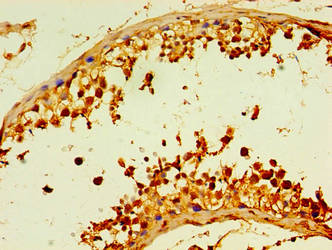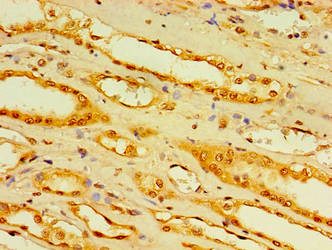Full Product Name
Rabbit anti-Homo sapiens (Human) DCP2 Polyclonal antibody
Alternative Names
DCP2 antibody; DCP2 decapping enzyme homolog (S. cerevisiae) antibody; DCP2, S. cerevisiae, homolog of antibody; DCP2_HUMAN antibody; decapping enzyme 2, S. cerevisiae, homolog of antibody; decapping enzyme homolog (S. cerevisiae) antibody; FLJ33245 antibody; hDpc antibody; m7GpppN-mRNA hydrolase antibody; mRNA decapping enzyme 2 antibody; mRNA-decapping enzyme 2 antibody; Nucleoside diphosphate-linked moiety X motif 20 antibody; nudix (nucleoside diphosphate linked moiety X)-type motif 20 antibody; Nudix motif 20 antibody; NUDT20 antibody
Immunogen
Recombinant Human m7GpppN-mRNA hydrolase protein (1-385AA)
Immunogen Species
Homo sapiens (Human)
Conjugate
Non-conjugated
The DCP2 Antibody (Product code: CSB-PA810265LA01HU) is Non-conjugated. For DCP2 Antibody with conjugates, please check the following table.
Available Conjugates
| Conjugate |
Product Code |
Product Name |
Application |
| HRP |
CSB-PA810265LB01HU |
DCP2 Antibody, HRP conjugated |
ELISA |
| FITC |
CSB-PA810265LC01HU |
DCP2 Antibody, FITC conjugated |
|
| Biotin |
CSB-PA810265LD01HU |
DCP2 Antibody, Biotin conjugated |
ELISA |
Purification Method
>95%, Protein G purified
Concentration
It differs from different batches. Please contact us to confirm it.
Buffer
Preservative: 0.03% Proclin 300
Constituents: 50% Glycerol, 0.01M PBS, PH 7.4
Tested Applications
ELISA, IHC
Recommended Dilution
| Application |
Recommended Dilution |
| IHC |
1:20-1:200 |
Storage
Upon receipt, store at -20°C or -80°C. Avoid repeated freeze.
Lead Time
Basically, we can dispatch the products out in 1-3 working days after receiving your orders. Delivery time maybe differs from different purchasing way or location, please kindly consult your local distributors for specific delivery time.
Usage
For Research Use Only. Not for use in diagnostic or therapeutic procedures.








